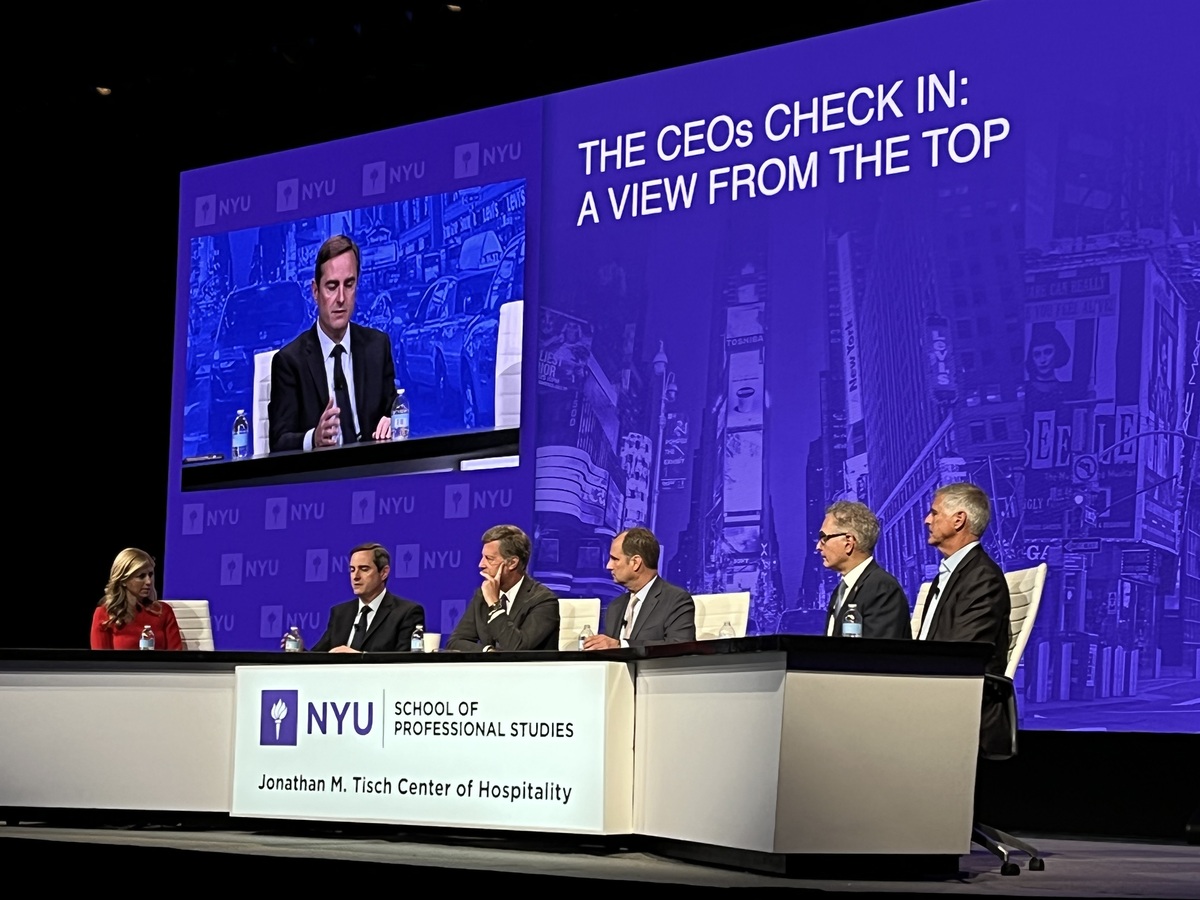Global Hotel CEOs Say Demand Can Weather a Downturn

Skift Take
The mood at the 44th Annual NYU International Hospitality Industry Investment Conference was upbeat on Monday, even with the industry facing some challenges.
Among the positive news was the prediction that revenue-per-available-room, so-called RevPAR, will exceed 2019 numbers before the end of the year, according to data company STR and Tourism Economics, a global tracking company.
During a morning session that kicked off the conference, “The CEOs Check In: A View From the Top,” the panelists — Keith Barr, CEO of IHG Hotels & Resorts, Sébastien M. Bazin, chairman and CEO of Accor, Anthony Capuano, CEO of Marriott International, Mark S. Hoplamazian, president and CEO and Hyatt Hotels Corporation, and Christopher Nassetta, president and CEO of Hilton — all said they have never seen demand like they are seeing now.
“There is a human urge to get together, to reconnect, to convene — whether it’s for business or personal reasons. There is just this amazing human and emotional quotient to it. And that is what is driving these numbers. It’s not just leisure travel. Corporations are desperate to get their people back together,” Hoplamazian said.
The speed at which the industry has recovered is swift. “After (September 11) and the Great Recession, it took four to five years to recover, but not now,” Capuano said. “Service delivery is the biggest challenge.”
The labor shortage continues to be an obstacle, according to the CEOs. “I never saw so much demand and such pricing, but many of our hotels can’t accept full occupancy,” Bazin said. “We don’t have the personnel. We don’t have the labor. We have to leave two floors empty as we can’t serve our people. This is a tragedy that the five of us have to respond to very quickly and together.”
IHG Hotels & Resorts is down 20 to 25 percent in staff, according to Barr. That number is 10 percent at Accor, Bazin said.
Nassetta believes these numbers will correct themselves, and staffing should be less of an issue by October. One way to jumpstart the correction is by making shifts more flexible. The CEOs discussed the attractiveness of a bus-stop schedule where a work day starts when children are dropped off at the school bus stop and ends when they come home from school.
It seemed apropos that the U.S. Commerce Department unveiled its new strategy to boost international tourism on the day of the conference. U.S. Commerce Secretary Gina Raimondo released the goal of attracting 90 million international visitors by 2027, who will spend an estimated $279 billion annually, a figure greater than prior to pandemic.
The panelists commented that would be accomplished if pre-departure Covid testing were eliminated. “It is the most absurd thing,” Barr said. “We have to take the friction out of travel and this testing tops the list.”
Nassetta said he has been working with Secretary Raimondo to get testing reversed, but the latest Covid surge is making that difficult.
Another focus of the session was diversity — ironic as beside moderator Sara Eisen, anchor of CNBC’s the “Closing Bell,” there was absolutely no diversity on the panel.
Marriott had a press conference earlier in the day launching “Marriott’s Bridging the Gap,” a $50 million development program focused on addressing the barriers to entry that historically underrepresented groups face in owning and developing hotels in the U.S. and Canada.
“Underrepresented categories include black ownership, Latin ownership, female ownership, and Native American ownership. They are woefully behind. And so we launched a platform. And my guess is my colleagues here will do something similar,” Capuano said.
IHG’s Barr shared that company’s new chair is a woman — Deanna Oppenheimer. When undertaking the search to fill this role, the requirement of previous chair experience had to be eliminated.
China’s Covid lockdowns are also adding uncertainty to complete recovery. “The elephant in the room is Greater China,” Barr said. There was a sense of optimism, though, as earlier in the day, Beijing announced it would relax some of its Covid restrictions.
Another issue to contend with is what Nassetta calls the “r-word” — recession.
“We all have to make sure we are prepared as the Federal Reserve here in the U.S., and a lot of places around the world need to tamp down inflation, and the way they do that is by slowing economies,” he said. “But in the face of potentially reduced economic growth, there’s still a massive amount of demand, especially as it relates to business and meetings and events.”
Today’s hotels must be more than just a place for a head in a bed. “It’s far broader than selling room nights,” Bazin said. “It’s Increasingly a concierge service. We want our guests to come back richer in terms of experience, to help them discover something they can’t discover on their own.”




